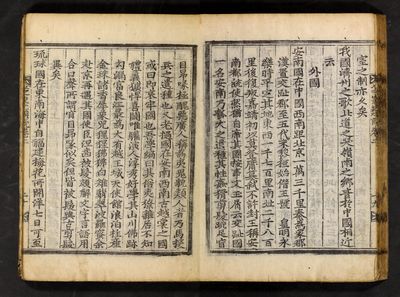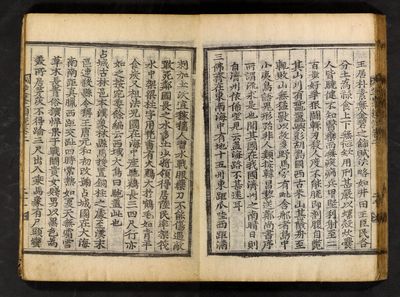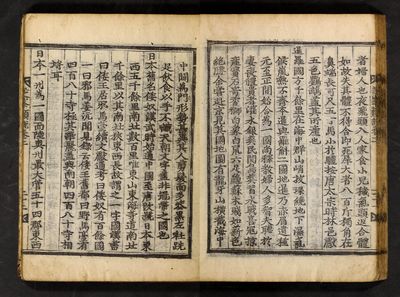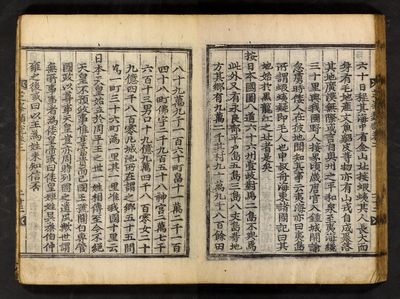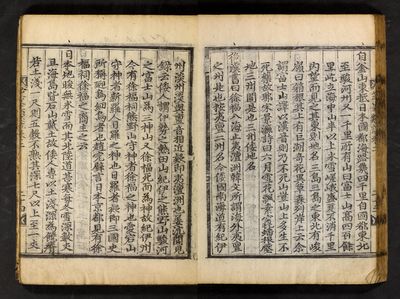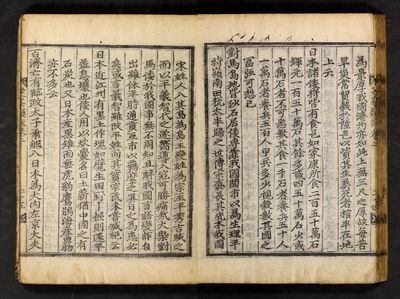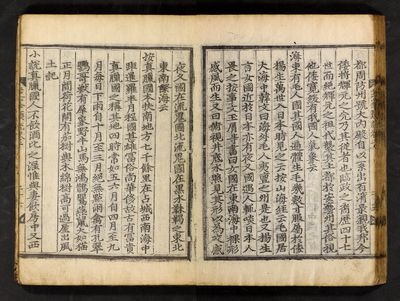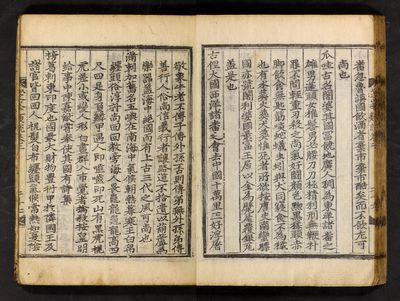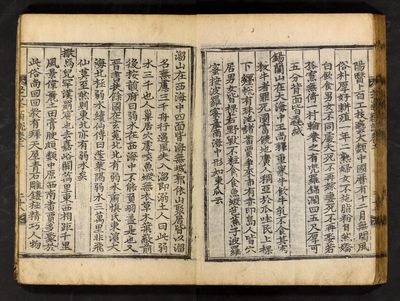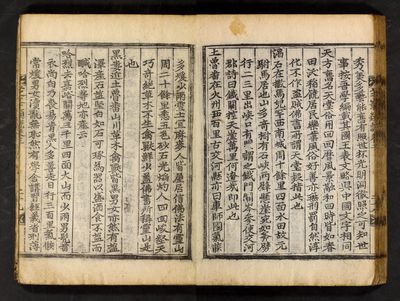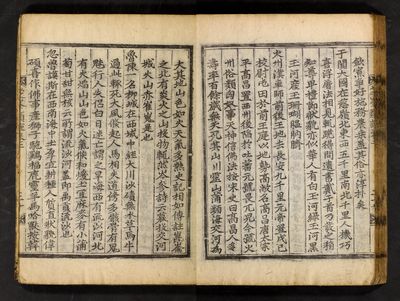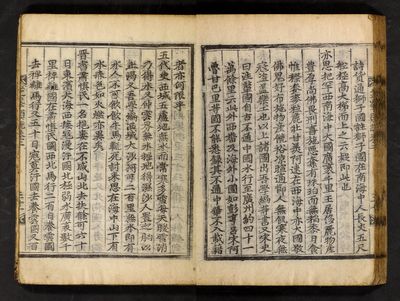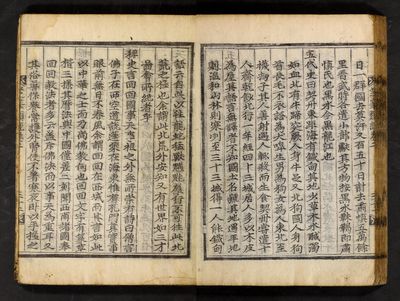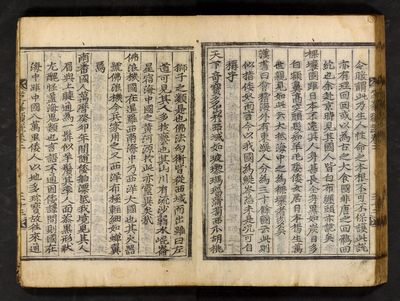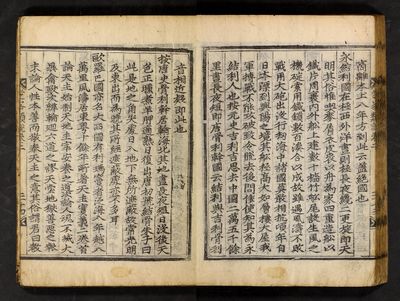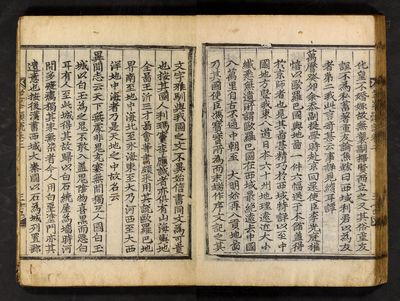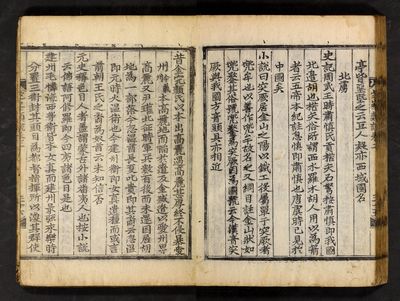"(Translation) 李睟光 外國"의 두 판 사이의 차이
Jangseogak (토론 | 기여) (→Student 8 : Younès M'Ghari) |
(→Student 7 : King Kwong Wong) |
||
| 330번째 줄: | 330번째 줄: | ||
---- | ---- | ||
*Translations: | *Translations: | ||
| + | 21. 古俚大國。西洋諸番之會。去中國十萬里。王好浮屠。敬象牛。老不傳子。傳外孫。否則傳弟。無外孫弟。傳善行人。俗尚信義。行者讓路。道不拾遺。以葫蘆爲樂器。蓋海中絶國。而有上古三代之風。可尚也。 | ||
| + | |||
| + | 22. 滿剌加。舊名五嶼。在南海中。氣候朝熱暮寒。王白帛纏頭。俗淳朴。尚回回敎。旁海人畏龜龍。龜龍高四尺四足。身負鱗甲。遇人卽嚙。嚙卽死。山有黑虎。視虎差小。或變人形。白晝群入市。覺者擒殺。按皇明給事中陳嘉猷。嘗奉使其國。有詩集。 | ||
| + | |||
| + | 23. 榜葛剌。東印度也。國最大。財物豐衍。甲於隣國。王及諸官。皆回回人。祝髮白布纏頭。氣候常熱如夏。陰 | ||
| + | |||
25. 溜山在西海中。四面皆海。無城郭。依山聚居。皆以溜名。無慮三千。舟行遇風失入溜卽溺。土人曰此弱水三千也。人巢居穴處。啖魚蝦無衣。草木葉蔽前後。按韻府曰。弱水在西海中。不能負羽。蓋是也。又晉書。扶餘國在玄菟北。北有弱水。肅愼氏東濱大海。北極弱水。續仙傳曰。蓬萊隔弱水三萬里。非飛仙莫至。然則東北亦有弱水矣。 | 25. 溜山在西海中。四面皆海。無城郭。依山聚居。皆以溜名。無慮三千。舟行遇風失入溜卽溺。土人曰此弱水三千也。人巢居穴處。啖魚蝦無衣。草木葉蔽前後。按韻府曰。弱水在西海中。不能負羽。蓋是也。又晉書。扶餘國在玄菟北。北有弱水。肅愼氏東濱大海。北極弱水。續仙傳曰。蓬萊隔弱水三萬里。非飛仙莫至。然則東北亦有弱水矣。 | ||
2018년 7월 8일 (일) 21:59 판
| Primary Source | ||
|---|---|---|
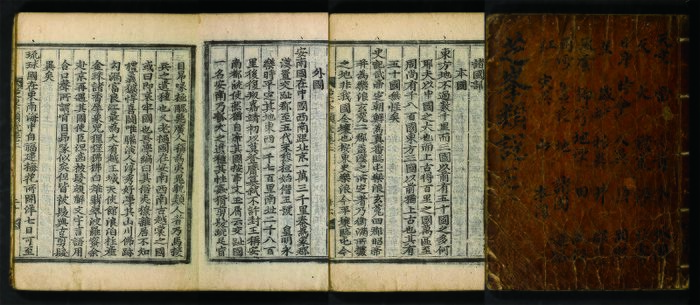 |
Title | |
| English | ||
| Chinese | 芝峯類說 | |
| Korean(RR) | 지봉유설(Jibongyuseol) | |
| Text Details | ||
| Genre | Royal Documents | |
| Type | ||
| Author(s) | 李睟光 | |
| Year | ||
| Source | ||
| Key Concepts | ||
| Translation Info | ||
| Translator(s) | Participants of 2018 Summer Hanmun Workshop (Advanced Translation Group) | |
| Editor(s) | ||
| Year | 2018 | |
목차
- 1 Introduction
- 2 Original Script
- 3 Discussion Questions
- 4 Further Readings
- 5 References
- 6 Translation
- 6.1 (sample) : Jaeyoon Song
- 6.2 Student 1 : (Write your name)
- 6.3 Student 2 : (Write your name)
- 6.4 Student 3 : (Write your name)
- 6.5 Student 4 : (Write your name)
- 6.6 Student 5 : Inho Choi
- 6.7 Student 6 : Kanghun Ahn
- 6.8 Student 7 : King Kwong Wong
- 6.9 Student 8 : Younès M'Ghari
- 6.10 Student 9 : (Write your name)
- 6.11 Student 10 : (Write your name)
- 6.12 Student 11 : (Write your name)
- 6.13 Student 12 : (Write your name)
- 6.14 Student 13 : (Write your name)
- 6.15 Student 14 : (Write your name)
Introduction
Original Script
Discussion Questions
Further Readings
References
Translation
(sample) : Jaeyoon Song
- Discussion Questions:
Student 1 : (Write your name)
- Discussion Questions:
Student 2 : (Write your name)
- Discussion Questions:
Student 3 : (Write your name)
- Discussion Questions:
Student 4 : (Write your name)
- Discussion Questions:
Student 5 : Inho Choi
- Translations
17. 海東有毛人國。其國人遍體生毛幾數寸。服屬於倭。楊生萬世入日本時見之云。按山海經云毛國居大海中。韓文曰海外毛人夷亶之州是也。又楊生言女國近於日本。亦有夜叉國。遇人輒啖。日本人畏之。按事文玉屑等書曰。女國在東南海中。裸形感風而生。又曰俯視井底水。照見其形。以爲交感。夜叉國在流鬼國北。流鬼國在黑水靺鞨之東北。東南際海云。 On the east of the sea(ocean?), there is the country of hairy people. Its people have hair all over their body which 'reaches' a few Chon. They submit to the Japanese. Yangsaeng of 10000 generations said he saw it when entering Japan. According Classic of Mountains and Seas, The Country of Hairy people is in the middle of the sea. This is what Hanwen called as the Hairy people's land(island?) of Idan on the outskirt of the ocean. Also, Yangsaeng told that the country of women is close to Japan and that there is the country of beasts, and the Japanese was afraid of it. According to what Samunokseol(Samunoksŏl) and others wrote, the country of women is in the southeast sea, and they are naked and are born by contracting the wind-force(?). Also, it is said they communicate by illuminating their figures as they crouch upon a well(hard to tell its meaning). The country of beasts is in the north of the country of Yugwi. The country of Yugwi is in the northeast of Malgal of the Black Water tribe. It reaches the sea on the east and the south(This is all said by Samunokseol).
18. 按眞臘國本扶南。地方七千餘里。在占城西南海中。距暹羅半月程。國甚雄富。俗尚華侈。故古有富貴眞臘國之稱。其地四時常如五六月。自四月至九月。每日下雨。自十月至三月。絶無點雨。禽有孔翠鸚哥。獸有犀象野牛山馬。無鴻鵲鶯燕。鼠大如猫。正月間荷花開。有茄樹與木綿樹。高可過屋。出風土記。
19. 小說。眞臘國人。不飮酒比之淫。惟與妻飮房中。又西番忽魯謨國。飮酒者棄市。棄市酷矣。而不飮。尤可尚也。
20. 爪哇。古名闍婆其國富饒。地廣人稠。爲東洋諸番之雄。男蓬頭女椎髻。男必腰刀。刀極精利。刑無鞭朴。罪不問輕重。刃殺之。尚氣好鬪。顔色黝黑。猱頭赤脚。飮食無匙筯。啖蛇蟻蟲蚓。與犬同寢食。不爲穢也。有水葬火葬犬葬。惟死者所欲。按唐史。南蠻驃國。亦號闍利婆。國最富。王居以金爲甓。屋覆銀瓦蓋是也。
- Discussion Questions:
Student 6 : Kanghun Ahn
- Translations:
24. 錫蘭山在大海中。王尚釋重象牛。飮牛乳不食其肉。殺牛者罪死。國富饒。地廣人稠。亞於爪哇。民上裸下纏帨。有珠池。諸番賈爭來市。有赤印島。人皆穴居。男女皆裸若野獸。不粒食。食魚蝦芭蕉子波羅蜜。按波羅蜜産南海中。形如東瓜云。
Ceylon (Sri Lanka) exists in the middle of the sea. Its kings venerate the Shakyamuni Buddha, and cherish elephants and cows. They drink milk, and do not eat beef. Those who kill cows are to be punished with execution. The country is opulent. Its land is vast, and has a large population, which is comparable to Java. They do not wear tops, and wind their bottoms with towels. There is a place where beads are abundant, so merchants there compete with each other, while forming a market nearby. There is an island called 赤人島, where people live in caves. Both men and women are naked like beasts. They do not eat grains. They instead eat fish, toads, plantains, and jackfruits. As for Jackfruits, they grow in the middle of the southern sea. It is said that they look like gourds.
25. 溜山在西海中。四面皆海。無城郭。依山聚居。皆以溜名。無慮三千。舟行遇風失入溜卽溺。土人曰此弱水三千也。人巢居穴處。啖魚蝦. 無衣草木葉蔽前後。按韻府曰。弱水在西海中。不能負羽。蓋是也。又晉書。扶餘國在玄菟北。北有弱水。肅愼氏東濱大海。北極弱水。續仙傳曰。蓬萊隔弱水三萬里。非飛仙莫至。然則東北亦有弱水矣。
Liushan exists in the middle of the west sea. Its four sides are surrounded by the sea, so there are no fortifications. They gather and reside, relying on mountains. There are about three thousand places called “liu”. When boats encounter the wind, they lose their way, drift, and eventually sink. Its natives call it "three thousand lis of Ruoshui". People there make nests (and live there) or reside in caves, and eat fish and toads. They do not wear clothes, and cover their front and back with grass, trees and leaves. As I think about it, the book "Yunfu" states as follows: “Ruoshui exists in the middle of the west sea, and is not even capable of making a feather float.” So this is what it is. Also, the History of Jin says that the Puyo state is to the north of Xuantu. In the north, there was the Ruoshui, where the Sushen family reached all the way to the east of the great sea, and all the way to the north, which is the Ruoshui. The Xuxianzhuan (Sequel of the Biography of the Hermits) says that the Penglai blocks the way towards the three thousand lis of the Ruoshui, so one cannot get there, unless he is a flying hermit. Hence, there is also the Ruoshui to the northeast thereof.
26. 撒馬兒罕。漢罽賓也。去嘉峪關萬里。東西相距千里。風景偉麗。土田膏腴。頗類中原。西南番賈多聚於此。俗尚回回敎。有拜天屋。靑石雕鏤極精巧。人物秀美多藝能。舊有照世杯。光明洞徹。照之可知世事。按吾學編。載其國王表文。略與中國文字相同。
Samarkand was Kashmir during the Han period, and was a thousand lis apart from the Jiayu Guan. Its width (to the east and the west) is one thousand lis. Its scenery is vast and beautiful. Its land is fertile, which is pretty similar to the center of China. A lot of merchants of the Xinanpan gathered here. People are Muslims. They have their venues to venerate the heaven, which are decorated with blue stones in a very sophisticated fashion. Its people are superb, beautiful, and versatile. Back in the day, there was so-called Zhaoshibei, and its light was so vastly illuminating as to shine the whole world. As I think about it, the Wuxuebian contains the royal writings of its kings, and their letters seem to resemble those of China.
27. 天方。舊名天堂。俗用回回曆。風景融和。四時皆如春。田沃稻饒。居民樂業。風俗好善。亦無刑罰。自然淳化。不作盜賊。佛書所謂天堂。疑指此也。
Tianfang used to be called Tiantang. Its people used the Islamic calender. It had a harmonious scenery. Its four seasons are like spring. Its land is fertile, and its grains are abundant. People there delightedly work. Its customs comply with virtues, so there were no punishments, and people were naturally cultivated. They did not commit burglary, so it seems (at least doubtedly) to be what the Buddhist texts call the heaven.
- Discussion Questions:
Student 7 : King Kwong Wong
- Translations:
21. 古俚大國。西洋諸番之會。去中國十萬里。王好浮屠。敬象牛。老不傳子。傳外孫。否則傳弟。無外孫弟。傳善行人。俗尚信義。行者讓路。道不拾遺。以葫蘆爲樂器。蓋海中絶國。而有上古三代之風。可尚也。
22. 滿剌加。舊名五嶼。在南海中。氣候朝熱暮寒。王白帛纏頭。俗淳朴。尚回回敎。旁海人畏龜龍。龜龍高四尺四足。身負鱗甲。遇人卽嚙。嚙卽死。山有黑虎。視虎差小。或變人形。白晝群入市。覺者擒殺。按皇明給事中陳嘉猷。嘗奉使其國。有詩集。
23. 榜葛剌。東印度也。國最大。財物豐衍。甲於隣國。王及諸官。皆回回人。祝髮白布纏頭。氣候常熱如夏。陰
25. 溜山在西海中。四面皆海。無城郭。依山聚居。皆以溜名。無慮三千。舟行遇風失入溜卽溺。土人曰此弱水三千也。人巢居穴處。啖魚蝦無衣。草木葉蔽前後。按韻府曰。弱水在西海中。不能負羽。蓋是也。又晉書。扶餘國在玄菟北。北有弱水。肅愼氏東濱大海。北極弱水。續仙傳曰。蓬萊隔弱水三萬里。非飛仙莫至。然則東北亦有弱水矣。
26. 撒馬兒罕。漢罽賓也。去嘉峪關萬里。東西相距千里。風景偉麗。土田膏腴。頗類中原。西南番賈多聚於此。俗尚回回敎。有拜天屋。靑石雕鏤極精巧。人物秀美多藝能。舊有照世杯。光明洞徹。照之可知世事。按吾學編。載其國王表文。略與中國文字相同。
27. 天方。舊名天堂。俗用回回曆。風景融和。四時皆如春。田沃稻饒。居民樂業。風俗好善。亦無刑罰。自然淳化。不作盜賊。佛書所謂天堂。疑指此也。
28. 渴石。在撒馬兒罕西南。城周十餘里。四面水田。故元駙馬居也。山多奇樹。有石峽。兩壁懸崖。宛如斧劈。行二三里。出峽口有門。謂之鐵門關。岑參使交河郡詩曰。鐵關控天崖。萬里何遼哉。卽此也。
- Discussion Questions:
Student 8 : Younès M'Ghari
- Translation (29-32):
29. 土魯番。在火州西百里。古交河縣。亦曰車師國。氣候多煖少雨雪。土宜麻麥。人皆屋居信佛法。有靈山周二十餘里。悉五色砂石。光焰灼火。四回峻壑。天巧奇絶。草木不生。禽獸鮮少。蓋佛書所稱靈山是也。
Turpan1 is 100 li away in the West from Huozhou2. It belongs to the ancient 틀:Jiaohe4. It is also called the Jushi Kingdom5. Its climate is very warm and it rains and snows only a little. The local products are sesame and wheat. People [there] all live in houses and believe in Buddhism. The area extends over more than 20 li. The whole five colors6 are sand and stones. The light flare, the fire burns. There are four deep gullies. The sky is incredibly wonderful.<sup7></sup> The grass and trees do not grow. The birds and beasts are very few. There are Buddhist scripts praising the spirits in the mountain.
30. 黑婁。近土魯番。山川草木禽獸皆黑。男女亦然。有鹽澤産石鹽。堅白如石。可琢爲器。以盛酒食。不鹽而鹹。哈烈等地亦産云。
Heilou8 is close to Turpan. The mountains, rivers, grass, trees, birds, beasts are all dark. Men and women are too. There are salt ponds that produce rock salt. It is solid and white like stones. It can be cut to serve as a tool to drink and eat. It takes [humidity]9 in and is salty. In Herat10 and other places it is also produced in this way.
31. 哈烈。去嘉峪關萬三千里。四面大山而少雨。男髡首。衣尚白。乃喪易靑黑。人多善走。日行三百里。氣候常煖。男女瀆亂無恥。然有學舍。講習經義。省刑薄"斂。寡爭好施。務農桑。蓋其俗亦淳朴矣。
Herat is at 13000 li if one goes through the Jiayu Pass11.
32. 于闐大國。在葱嶺北。東西五千里。南北千里。人機巧。喜浮屠法。相見輒跪。得問遺書。戴于首乃發之。稍知尊卑禮節。狀貌亦似華人。有白玉河,綠玉河,黑玉河。産玉珊瑚膃肭臍。
1 土魯番: sinitic name of Turpan, a city located in modern Xinjiang, China, written as 吐鲁番 in Contemporary Mandarin Chinese (pinyin: Tǔlǔfān; Uyghur: تورپان).
2 火州: one of the designations of the city 高昌 (pinyin: Gāochāng; Uyghur: قاراغوجا) during the Yuan and Ming dynasties.
3 交河: 틀:One of the regions of China located at the East of Beijing.
4 縣: translating it 'county' as in Mandarin Chinese may pose the problem of its important size.
5 車師: the Jushi (pinyin: Jūshī), or Gushi (Mandarin: 姑師; pinyin: Gūshī), were a people who established a kingdom during the 1st millennium BCE in the Turpan basin.
6 五色: it can be metaphorically understood here as 'the environment' or 'the view'.
7 Interestingly, this passage looks familiar to the one of the 历代兴衰演义, written about a century later by Lǚ Fǔ (吕撫): "群山悉五色,砂石光焰灼人,峻壑穷崖,天巧奇绝。"
8 I could not find a place name that would correspond to this city today.
9 The author might also be thinking of salt as only an 'ingredient' absorbing liquids and sauces.
10 哈烈: ancient sinitic designation for the city Herat in Afghanistan (Persian and Pashto: هرات); in 1413, the sovereign Shah Rukh Mirza of the Timurid empire (r. 1404-1447) sends the emperor Yongle of the Ming (r. 1402-1424) a tribute; the same year, the latter sends a delegation to Herat. This is probably how the author came to know about Herat.
11 嘉峪關: the Jiayu Pass (pinyin: Jiāyù Guān) is the first frontier fortress at the west end of the Ming dynasty Great Wall of China, in modern Gansu, China.
- Discussion Questions:
Student 9 : (Write your name)
- Discussion Questions:
Student 10 : (Write your name)
- Discussion Questions:
Student 11 : (Write your name)
- Discussion Questions:
Student 12 : (Write your name)
- Discussion Questions:
Student 13 : (Write your name)
- Discussion Questions:
Student 14 : (Write your name)
- Discussion Questions:
